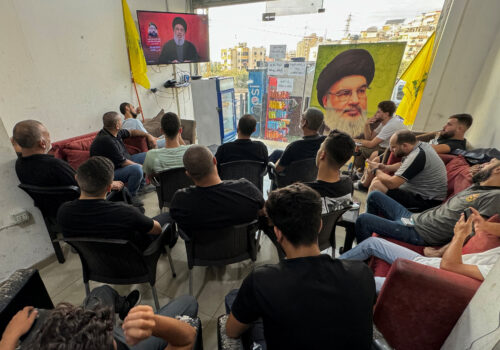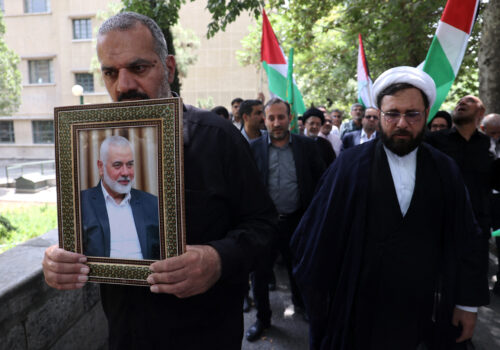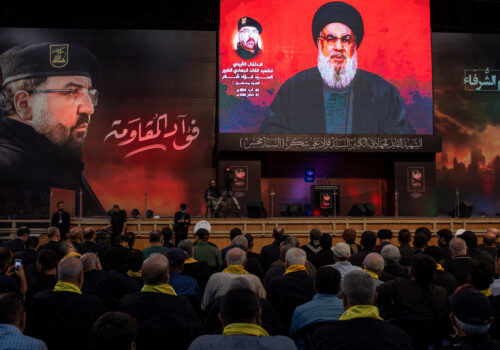How the Israeli intelligence community got its mojo back
In my twenty-six-year career at the Central Intelligence Agency (CIA), I found that there were many misnomers in the intelligence business that were shared by the public and even policymakers. One is the notion that the CIA should be able to foresee world events, a concept that I termed (with some derision) “predictive certainty.” Policymakers would quite naturally welcome—and likely push—the US intelligence community to tell them precisely what will happen on any given subject. That of course rarely occurs; it is a notion derived from espionage books and movies.
Instead, I always believed as an operations officer that we must strive to collect intelligence that ultimately can provide a warning to policymakers. That warning function was—and still is—key in any CIA station’s job description. The CIA performed admirably if we sent up the bat signal, so that policymakers can decide on various courses of action if or when something went down. An event may seem likely to occur (with signs, never definitive, that an invasion or a coup was planned, for example), so the intelligence collected must spur on policymakers to consider several options. “No surprises” was the mantra I would follow. During management stints in Washington, and while serving abroad as an operations officer, I would tell my State Department, White House, and Department of Defense colleagues that my collection missions should be judged as successful if they were never blindsided.
Yet there was an important caveat to my promises: I would assure a US ambassador that we would collect, we would warn, we would analyze and assess. But do not expect the intelligence to have such a level of granularity that it implied certainty of an outcome.
This will go down in Israeli military history, just like the preemptive strikes in 1967 by the IDF against Egyptian land and air forces.
During these last several days of late August, however, the Israeli intelligence community hit a grand slam by obtaining such exquisite intelligence that it was highly predictive in nature—and not only that, it also likely staved off a wider war. As such, the Israeli intelligence community deserves extraordinary credit for this intelligence coup. According to media reports, the Israelis collected information that not only indicated that Hezbollah was about to launch a significant attack against northern and central Israel, but also the precise time—5:15 a.m. local time on August 25—when the launches would occur and the specific units that would conduct the attacks.
This was a very noteworthy feat, in my view presumably gleaned from a combination of Israeli signals intelligence (an intercept of a warning order from within the Hezbollah hierarchy, for example); imagery of movement within the rocket, missile, or drone units themselves, perhaps via Israeli drones or other overhead collection; and even reporting from human sources, who could have told the Israelis the precise plans and intentions of the Hezbollah leadership. Let us not forget that Israel has shown an ability to penetrate Hezbollah, with the late July assassination in Beirut of Fuad Shukr, a close confidant and military adviser to Hezbollah leader Hassan Nasrallah.
This intelligence collection then allowed the Israel Defense Forces (IDF), launching reportedly up to one hundred aircraft, to effectively preempt the Hezbollah attack, destroying up to two-thirds of the rockets and missiles that would have been launched. This will go down in Israeli military history, just like the preemptive strikes in 1967 by the IDF against Egyptian land and air forces. So once again, how good was the intelligence this time around? It seems quite clear that Israeli pilots knew the precise location of the Hezbollah rocket and missile units, which was obtained by their colleagues in the Israeli intelligence community. As such, there must have been great satisfaction in the hallways of Israeli intelligence, having provided actionable targets to their military brethren.
This intelligence saved the lives of those Israelis—both civilian and military—who might have been hit by several hundred rockets and missiles. That in and of itself is a significant success. But there is more to praise, as this Israeli intelligence coup almost certainly avoided a wider war. In fact, the preemptive strike, based on the extraordinary collection, was de-escalatory in nature. Since there was no mass casualty event in Israel (military or civilian casualties emanating from a new Hezbollah attack), a massive Israeli response, including perhaps strikes on Beirut, was avoided. The Israeli intelligence community certainly won the day by avoiding that scenario. As did the region as a whole.
Finally, Hezbollah claims it was targeting Israeli national security infrastructure, including Mossad headquarters and a building housing elements of Unit 8200, the Israeli equivalent to the US National Security Agency. I sent a message to a former Israeli government official who is a friend of mine, noting, “You know you are doing something right if the enemy is trying to kill you.” What a sign of flattery for the Israeli intelligence officers, who nearly a year ago were reeling from the catastrophic intelligence failures of October 7, 2023. The attacks that day resulted in more than 1,160 Israelis and foreigners brutally killed, smashing the aura of the Israeli intelligence community. I am sure that there remains an enormous sense of guilt within the hallways of Mossad, Israeli military intelligence, and Shin Bet—similar to what we at the CIA felt after September 11, 2001. Yet as seen from the events of the last several days, on top of the successful hunt for high-value targets, the Israeli intelligence community has pulled itself up by its bootstraps and regained its mojo. That should reassure the Israeli public and policymakers, who rely on the intelligence community as Israel’s first line of defense.
Marc Polymeropoulos is a nonresident senior fellow in the Forward Defense practice of the Atlantic Council’s Scowcroft Center for Strategy and Security. He worked for twenty-six years at the CIA before retiring in July 2019 at the senior intelligence service level.
Further reading
Sun, Aug 25, 2024
After a failed attack, Hezbollah’s propaganda seeks to prevent a wider war with Israel
MENASource By David Daoud
Committed as Hezbollah is to saving its Gaza-based allies, the group does not currently want a full war with Israel.
Wed, Jul 31, 2024
Will the killings of Hamas and Hezbollah leaders lead to a wider war?
Fast Thinking By Atlantic Council
The recent killings of Hamas’s Ismail Haniyeh and Hezbollah’s Fouad Shukur, both reportedly by Israel, raise new questions about what’s next for the region. Atlantic Council experts share their answers.
Wed, Aug 7, 2024
Understanding Nasrallah’s speech: How will Hezbollah avenge Shukr?
IranSource By David Daoud
Hezbollah must now respond to Israel, but a routine retaliation will not suffice, given Fuad Shukr’s stature and the location of his killing.
Image: A person walks near a damaged residential building after Hezbollah launched hundreds of rockets and drones towards Israel in what the Iranian-backed movement said was a response to the assassination of a senior commander in Beirut last month, in Acre, northern Israel August 25, 2024. REUTERS/Ammar Awad



